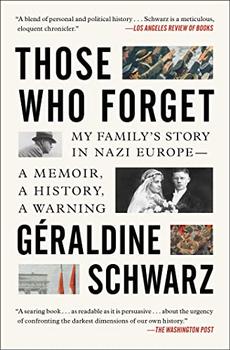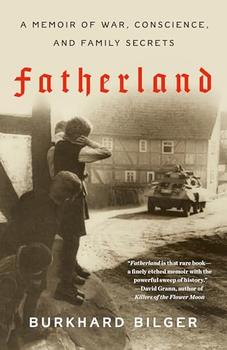Summary | Excerpt | Reading Guide | Reviews | Beyond the book | Read-Alikes | Genres & Themes | Author Bio

My Family's Story in Nazi Europe – A Memoir, A History, A Warning
by Géraldine SchwarzGrowing up in Germany and France, Géraldine Schwarz became curious about how Hitler rose to power, how people reacted to his ascendance and ultimate defeat, and more specifically what role her grandparents played as German citizens during this time. She discusses her findings and issues a warning about history repeating itself in her debut book, Those Who Forget, translated by Laura Marris.
Schwarz's grandparents were what she refers to as "Mitläufer" – those who "followed the current" – neither ardent supporters of Hitler's policies nor adamantly opposed to them, people who just continued to live their lives as the effects of the policies took shape. Like so many others, they turned a blind eye to the increasingly brutal treatment of their Jewish neighbors while benefiting from the political situation. One of Hitler's earlier moves was to economically incapacitate the Jewish population by forcing them to sell their businesses and property to non-Jews. The author shows how her grandfather took advantage of this by buying out a profitable petroleum business. He later excused his actions by claiming he gave the seller a better price than required under German law and consequently was actually helping him. It's the many "little blindnesses," Schwarz states, that allowed the government persecutions to continue, and "although the impact of each Mitläufer was tiny on an individual level it had a cumulative effect," eventually allowing "conditions for the worst state-orchestrated crimes known to humanity."
According to the author, a "pathological amnesia" developed after World War II. She realized that "in the apocalyptic atmosphere of postwar Germany, the priority was not revisiting the past but pulling together a new life." Her father, born during WWII, told her that the war years were never discussed when he was growing up. His history books ended with the Weimar Republic — the German government put in place following Kaiser Wilhelm II's abdication in 1918 and remaining until Hitler's appointment as Chancellor in 1933. Terms like "Konzentrationslager" (concentration camp) and "SS-Mann" (SS soldier) were removed from dictionaries. When Germans did remember the Hitler era at all, it was often tinged with nostalgia.
Schwarz goes on to discuss how under Helmut Kohl, Chancellor of Germany from 1982–1998, the country began to repair itself. She credits Kohl with forcing the population to remember the past and face their complicity, writing that "memory, when it is deliberately cultivated, can heal many wounds," and accuses other countries of refusing to come to terms with the uglier parts of their histories. Referencing France's cooperation with Germany during WWII and the Allies' deliberate carpet-bombing of civilian targets, among other examples, she extends this line of thinking to hypothesize that societies that do not do what she calls "memory work" are on a dire path: "[I]f history as such does not repeat itself, sociological and psychological mechanisms do, which push individuals and societies to make irrational choices by supporting regimes and leaders who are opposed to their interests, by becoming complicit in criminal ideas and actions." Schwarz urges readers to be aware of and on the lookout for these mechanisms.
I was expecting the author to draw stark parallels between the rise of Nazism and our current partisan climate, but while politically minded readers will certainly see similarities, she isn't explicit. Indeed, I was surprised at how little she emphasizes the worldwide rise of populist leaders and the widespread increase in xenophobia, calling out specific leaders and issues, such as Hungarian Prime Minister Viktor Orbán's anti-immigration policies, only briefly and late in the book. She hardly mentions the American president — just a few sentences — though her critique of him is scathing, stating that although his election was the impetus for writing the book, "Donald Trump is not a fascist - partly because he cannot commit to a cause other than himself. He is an opportunist who uses the same methods of mass manipulation that the fascists used a century ago in Europe."
Although the transition from history to analysis of current events is relatively abrupt, the placement of brief commentary on recent issues later in the book still works well considering that Schwarz's account is primarily chronological. Also, in deferring this commentary, she avoids turning off readers who disagree with her assessment or who pick up the book because of a specific curiosity about the historical rise of Nazism. In any case, the narrative is fascinating from start to finish, combining a top-notch family memoir with history and social criticism.
Like many, I've pondered the Holocaust over the years, wondering how such a thing could happen, how average, well-meaning people could permit a climate in which others are systematically persecuted or killed. Those Who Forget is enlightening in that regard, and provides a lot of food for thought. Schwarz's warning, too, is an important one that should be heeded. Many of the issues present in 1930s Germany have re-emerged in the past decade (in particular with the international rise of white supremacist groups, encouraged by populist leaders), and only through seeing the parallels can we avoid repeating the mistakes of the past. Hopefully, the book will attract a wide audience, even if some disagree with the author's conclusions. It's an absolutely excellent choice for anyone interested in history and current events, and for book groups, too, providing timely and important fodder for deep discussion.
![]() This review was originally published in The BookBrowse Review in October 2020, and has been updated for the
October 2022 edition.
Click here to go to this issue.
This review was originally published in The BookBrowse Review in October 2020, and has been updated for the
October 2022 edition.
Click here to go to this issue.

If you liked Those Who Forget, try these:

by Burkhard Bilger
Published 2024
A New Yorker staff writer investigates his grandfather, a Nazi Party Chief, in this "unflinching, gorgeously written, and deeply moving exploration of morality, family, and war" (Patrick Radden Keefe, author of Empire of Pain).

by Maria Hummel
Published 2015
The novel bears witness to the shame and courage of Third Reich families during the devastating final days of the war, as each family member's fateful choice lead the reader deeper into questions of complicity and innocence, to the novel's heartbreaking and unforgettable conclusion.
Your guide toexceptional books
BookBrowse seeks out and recommends the best in contemporary fiction and nonfiction—books that not only engage and entertain but also deepen our understanding of ourselves and the world around us.